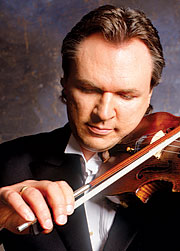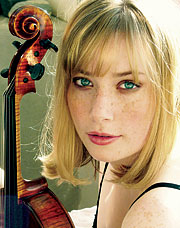Fiddler and composer Mark O’Connor knew he’d reached the pinnacle of his profession not when superstar cellist Yo-Yo Ma agreed to play with him, but when he found he could play without Ma.

O’Connor, who’s long held the admittedly ambitious goal of pioneering a peculiarly American classical music infused with traditional folk idioms, spent years performing alone. While melodies for duets and trios bounced around his brain, his inability to find suitable playing partners meant he stuck to solos. None of the musicians he consulted seemed to understand his style, or have the technical prowess to mimic it. And then he met Ma.

“With Yo-Yo, his technical skills and virtuosity were on such an extreme level, he could play anything,” O’Connor remembers. “Everything was possible.”
O’Connor and Ma joined with double bassist Edgar Meyer in 1995 to record Appalachian Waltz, an album of complicated reels and hornpipes released the following year. While a few reviewers withheld their highest praise, even they were mostly charmed by the fusion of fine art and folk: “Docking a few tracks—‘Canning Pickles,’ for example—would have made Appalachian Waltz a true glory, instead of 90-percent grandeur,” wrote Keith Howell in Gramophone.
Civilian fans harbored no such reservations, pouncing on the title track as a wedding march: Al Gore’s daughter Karenna walked down the aisle to the composition’s sweetly serene melody (played by O’Connor himself). The barefoot elegance of O’Connor’s compositions, which neatly meld energy and awe, also impressed film and television producers bent on finding the right music to convey early America’s spirit: PBS producers recruited O’Connor to score a six-part documentary on the Revolutionary War, and John Williams asked him to contribute to the soundtrack he created for The Patriot. O’Connor later reprised his role as soundtrack artist for 2003’s Gods and Generals, the star-studded prequel to Gettysburg.
Young-blood transfusion
The nation had apparently been awaiting a “bluegrass string ensemble,” as O’Connor puts it. The popular group rode the late-1990s old-timey wave, which reached its apex with the release of the O Brother, Where Art Thou? soundtrack. They produced one more widely acclaimed album—the Grammy-winning Appalachian Journey, in 2000—before disbanding.
After the partnership ended, O’Connor discovered audiences still wanted to hear the group’s greatest hits, while he was in no rush to return to performing alone. “I got frustrated being so lonely,” says O’Connor, 45. “The bubble burst, and I couldn’t contain my ideas any longer.”
So O’Connor took the daring step of replacing his two well-known colleagues with unknowns just out of Juilliard, a move tantamount to casting a community-theater star as the next Spiderman.
“I worried it would fall so short, it would be a waste of time,” he admits. Improbably, it worked: O’Connor’s Appalachian Trio has continued to garner warm accolades from listeners and critics. And O’Connor claims the experience of sharing a stage with recent college graduates has been at least as richly rewarding as playing alongside two of the biggest names in strings.
“They play the music with so much vitality and virtuosity,” he says. “I literally can’t wait to play with them.”
O’Connor credits his playing partners with helping him improve his technique, already so sharp that when he was 20 years old, he received a fan letter from Chet Atkins.
“I feel like with the new energy, I have to stay on top of my game.”
When O’Connor’s Americana Classical road show rolls into Brevard this week, it will feature the latest in a revolving lineup of collaborators. Since the trio’s formation, six musicians have rotated through the supporting spots. Crossing Bridges, a 2002 live recording of the group at Clayton College and State University in Morrow, Ga., featured violist Carol Cook and cellist Natalie Haas, much to the delight of Strings Magazine‘s James Reel, who wrote: “These performances may be preferable to the earlier albums, if only because the confident Haas isn’t as deferential as Ma.”
O’Connor says he’s been amazed by the poise of the young musicians he’s auditioned for the project, comparing their perpetual coolness to his youthful self-doubt: “There’s a certain kind of confidence that young people have today that, when guided properly, is a real asset. When I was their age, I had the moments of brashness that young people can have, and then I had the moments when I felt I wasn’t worthy. But I don’t detect that about young musicians today. They’re going to use the opportunity to showcase their talents, and they’re not going to back away from it.”
O’Connor would have been entitled to feel cocky as a young musician, having won the Grand Masters Fiddle Championship as a 13-year-old. His first instrument was guitar, which he played so proficiently that the Winfield, Kan., guitar flatpicking competition changed its rules so winning contestants had to wait five years to re-enter.
O’Connor did—and won again.
Although he had classical training, he became a professional under the auspices of country music, winning the Country Music Association’s “Musician of the Year” award every year from 1991 to 1996. In 1993, he toured with Marty Stuart and Travis Tritt, the latter a rowdy, leather-clad country rocker who had nothing in common with Mozart but a love of drink and women.
But O’Connor still dreamed of adding his name to the very short list of American classical composers (a list that usually begins and ends with Aaron Copland).
“The U.S. has always deferred to the European model,” he says. “I really wanted to make my career discovering how American folk music informs classical music.”
He recently completed his first symphony, which will have its debut later this year. O’Connor says he was gratified that the musicians playing the piece moved comfortably within the idiom he has worked so hard to develop. He’s witnessed the same trend in the periodic auditions he holds to staff his Appalachian Trio.
“Maybe they’ve not played it, but they’ve heard it,” he explains. “Perhaps they don’t perform it, but they’ve talked about it. They know what I do. It makes me feel like what I’ve been doing is resonating in the string world.”
Mark O’Connor and the Appalachian Waltz Trio perform at 8 p.m. at Whittington-Pfohl Auditorium in Brevard on Tuesday, July 10, as part of the “Variations” concert series of the Brevard Music Festival. $20-$30. Call the box office at (888) 384-8682 or visit brevardmusic.org to order tickets. The festival runs through Sunday, Aug. 5; see adjoining schedule of remaining concerts.



You do not have a caption for the young lady in the picture. However, I do know her as she is my cousin, violist Gillian Gallagher Gillian Gallagher.